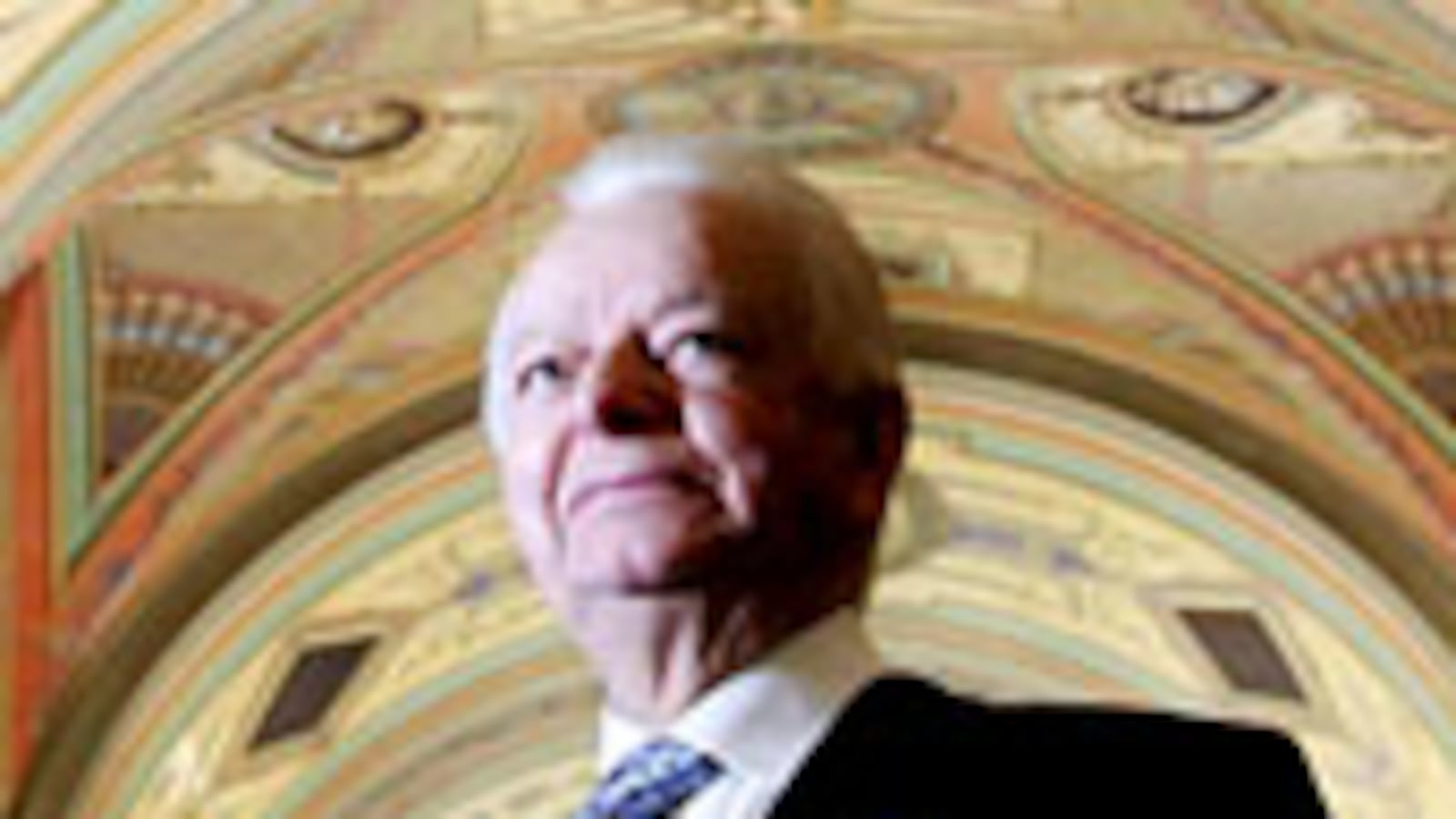
Robert Byrd of West Virginia, the longest-serving senator in U.S. history, died on Monday at the age of 92. He rose from rural poverty to the pinnacle of power, and journeyed from racism to racial enlightenment. His finest hour came in opposing the Iraq war. Paul Begala pays tribute to a statesman.
The dumbest thing F. Scott Fitzgerald ever wrote was that there are no second acts in American life. In fairness to Fitzgerald, that line came from notes for a novel he never finished. One believes if he’d had time he would have tossed that sentence in the trash, because if there is anything we know about America, it is that it’s the land of the second chance.
Robert Byrd had a second act. And he used it to stand for equality and opportunity and against an unjust war and unconstitutional usurpations. The longest-serving senator in American history has passed, and as we look back at the arc of his life it is a testament to the dynamism of the American story.
The leading Democrats were lining up to support Bush’s war, but Byrd would have none of it. “Blank check!” he shouted from the Senate floor. “This is, plain and simple, a blank check given to the president of the United States. I won't touch it.”
He served in the Senate for nearly a quarter of our nation’s history, working with eleven American presidents, and casting votes in the Senate before the current president was even born. A fiddle-playing populist from the coalfields of Raleigh County, West Virginia, he always believed government should be on the side of the people—at first just white people; as he and our republic matured, his definition of who government should defend expanded. Yes, there was the one-year flirtation with the Ku Klux Klan in the 1940’s—a stain that marked him for life—and his opposition to the Civil Rights Act of 1964. Critics on the right properly excoriate him for those historic mistakes. But they ignore Ronald Reagan’s youthful support of one-world government and the Gipper’s strong opposition to the Civil Rights Act, the Voting Rights Act and the Fair Housing Act, too.
While so many southern Democrats changed parties because of race, Byrd changed his position on race. He went on to earn a 100% rating from the NAACP, and shepherded $10 million in funding for Martin Luther King Memorial on the National Mall. While personally opposed to gay marriage, he opposed soiling the Constitution with the so-called Federal Marriage Amendment, which would write anti-gay discrimination into our founding document. An old-school patriot, Byrd also helped block a constitutional amendment banning flag burning that would have placed the first-ever restriction on the First Amendment.
Byrd’s politics demonstrated a commitment to open-mindedness befitting a man who earned his undergraduate degree when he was 77 years old. Although representing a state in which George W. Bush had thumped Al Gore, Byrd was fearless in standing up to a presidency he called “reckless and arrogant.” It was in opposing Mr. Bush’s attacks on the Constitution that Sen. Byrd placed himself squarely on the right side of history. "The Constitution,” he said, “the foundation of this great nation, is under attack by an administration bent on secrecy, that has to be dragged kicking and screaming to answer questions, that follows a path of myopic recklessness."
And when Bush misled our nation into war, the creaky old son of the coalfields gave his greatest roar. It was barely a year after the horror of 9/11—a tragedy Mr. Bush might have prevented but one which he zestily exploited. Democrats—including some of the leading lights of the party—were lining up to support Mr. Bush’s call for war in Iraq. The media, cowed by Bush and fed manipulated intelligence by Cheney, formed an amen chorus.
But Robert Byrd would have none of it. “Blank check!” he shouted from the Senate floor. “This is, plain and simple, a blank check given to the president of the United States. I won't touch it.” As he loved to do, he invoked ancient Rome, but he also referred to his own history. “I was one of the senators who voted for the Gulf of Tonkin resolution,” he said, lamenting his role in authorizing the Vietnam War. “Yes, I voted for the Gulf of Tonkin resolution. I am sorry for that. I am guilty of doing that. I should have been one of the two, or at least I should have made it three, senators who voted against that Gulf of Tonkin resolution. But I am not wanting to commit that sin twice, and that is exactly what we are doing here. This is another Gulf of Tonkin resolution. I am not going to vote for that this time. No. Don't count me in on that.”
Schoolchildren for generations should study Byrd’s powerful and principled opposition to the war in Iraq. His opposition was brave and tragically prescient. His archaic oratorical flamboyance was, to modern ears, almost cartoonish. But in opposing the Bush-Cheney march to war, his grandiloquence changed to eloquence. If only more of his fellow senators had listened.
Robert Byrd will be remembered for his longevity: born just 17 years after the 19th century; he died a decade into the 21st. I hope he will also be remembered for his remarkable American journey: from desperate rural poverty to the height of power; from bitter racism to racial equality; from supporting a trumped-up call for war in Southeast Asia to opposing one in the Middle East.
Marcus Tullius Cicero, the Roman constitutionalist, orator and Consul, said “Any man can make mistakes, but only an idiot persists in his error.” Byrd was no idiot. He made his mistakes, but he refused to persist in them. Indeed, the legacy of Robert C. Byrd is not that when he was young he was so closed-minded, but rather that when he was old he was so open-minded. His second act was political theater at its best.
Paul Begala is a CNN political contributor and a research professor at Georgetown University's Public Policy Institute. He was a senior strategist for the 1992 Clinton-Gore campaign and served as counselor to President Clinton in the White House.






